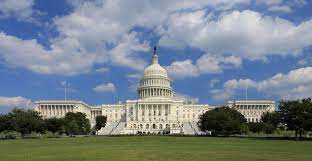When discussion turns to how to make government “better,” however any particular person would conceive that condition, libertarians understand that we are in the fraught world of second-bests. In other words, because of the nature of the state, no solution that merely attempts to reform it will be or could be truly satisfying. The system will continue to feature exploitation, rent-seeking, public-choice and knowledge problems, and worse.
We have an example of this in a recent Soho Forum Debate in which political scientist Terry Moe of Stanford University and Gene Healy of the Cato Institute argued over whether Moe’s proposal for federal legislative fast-tracking, which is intended to enable presidents to eliminate congressional obstruction, is a good idea. I think Healy, a long-time critic of “the cult of the presidency,” won the debate, but that of course doesn’t mean that leaving things as they are is a good idea. Healy would agree.
Moe would add a feature to how Washington does things. His constitutional amendment would empower presidents to put legislation on a fast track. Thus within, say, 90 days after introduction, both houses of Congress would have to vote up or down on the president’s bill–no committees, no amendments, no filibuster. Legislation could still be handled the old-fashioned way. Members of Congress could introduce bills that would go through the committee process of both houses and would be subject to amendment. Presidents could still veto those bills. Any prevailing filibuster rules would apply. Moe would simply put another arrow in a president’s quiver.
Why does Moe want to do this? (It’s not unprecedented, as Moe acknowledges: Congress has legislated that trade bills can be fast-tracked in this manner.) Simply put, he thinks the federal government is failing the country and has been doing so for a long time. The system set up by the framers of the Constitution, he says, is obsolete: they were operating under far different conditions from today’s, and it’s long past the time for change. Specifically, the system has too many “veto points” at which legislation can be derailed, resulting in paralysis and a dire failure to address important matters. (He offers immigration reform as a prime example.) The system all but assures that nothing happens, Moe insists, and we simply can’t go on this way any longer.
One can readily acknowledge that things are not good now without embracing Moe’s or any other particular reform. After all, it’s always possible to make thing worse.
I guess if your priority is the passage of legislation–any legislation–Moe’s proposal would be appealing. But who judges Congress merely by how many bills it passes? (Come to think of it, some newspapers apparently do.) Quality is more important than quantity. Different people will evaluate the difficulty in passing bills differently depending on what they think the government would do with a free hand.
For people who love individual liberty, the first thing to notice is that legislative obstacles are bad only if the likely legislation would reduce government power and expand government respect for freedom. Gridlock, however, is good (with qualifications below) whenever it blocks government interference with peaceful private conduct, whether “personal” or “economic.” (I regard this distinction as pernicious. Economic liberty is personal liberty; making and spending money in pursuit of one’s life projects are as personal as human activity can get. Dividing liberty into two spheres, an idea endorsed decades ago by the Supreme Court, has been catastrophic. The courts scrutinize limits on freedom of speech and religion far more stringently than they scrutinize limits on the use of property. See my What Social Animals Owe to Each Other.)
The reverse is also the case; libertarians would applaud fast-tracking for bills that would remove restrictions on liberty, but oppose it for liberty violations. The problem is that exclusively pro-liberty fast-tracking is not likely to be adopted by the powers that be. Since bad bills easily outnumber good ones, fast-tracking would be no welcome reform.
This might suggest that gridlock is the best we can hope for in the current world. I have tended to think that is the case, but I things aren’t that simple. As Healy points out, the libertarian preference for gridlock must be tempered by the fact that stymied presidents can turn to executive orders to get what Congress refuses to given them. Recent presidents have done this often. So the situation looks bleak. Reformed or not, the government will produce violations of liberty most of the time.
To be sure, Healy scored direct points against Moe’s amendment during the debate. For some matters the proposal terrifies him. For example, George W. Bush wanted a much broader authorization for the use of military force after 9/11 than Congress gave him. Had fast-track been the rule, Bush would probably have gotten his way because members of Congress would have been afraid to vote against him after the horrific attacks. Could the government’s war record since the start of the century been worse as a result? Maybe.
On the other hand, Healy suggested that Moe’s amendment might not change things all that much. With fast-track the houses of Congress could defeat a presidential bill, then introduce something similar in the traditional manner, allowing amendments, etc. It occurs to me that presidents hoping for legislative success might informally negotiate with members of Congress to arrive at a bill that has a good chance of being fast-tracked even through houses in the other party’s hands. Thus fast-tracking might accomplish much less than Moe expects.
We should be surprised by none of this. That the state–an irredeemably flawed and predatory organization–cannot be satisfactorily reformed is unremarkable. Conceived in sin and conquest, the state is based on the principle that some people should be empowered to coerce other people simply for living their lives in peaceful yet disapproved ways. Thus the only true reform is abolition.
































